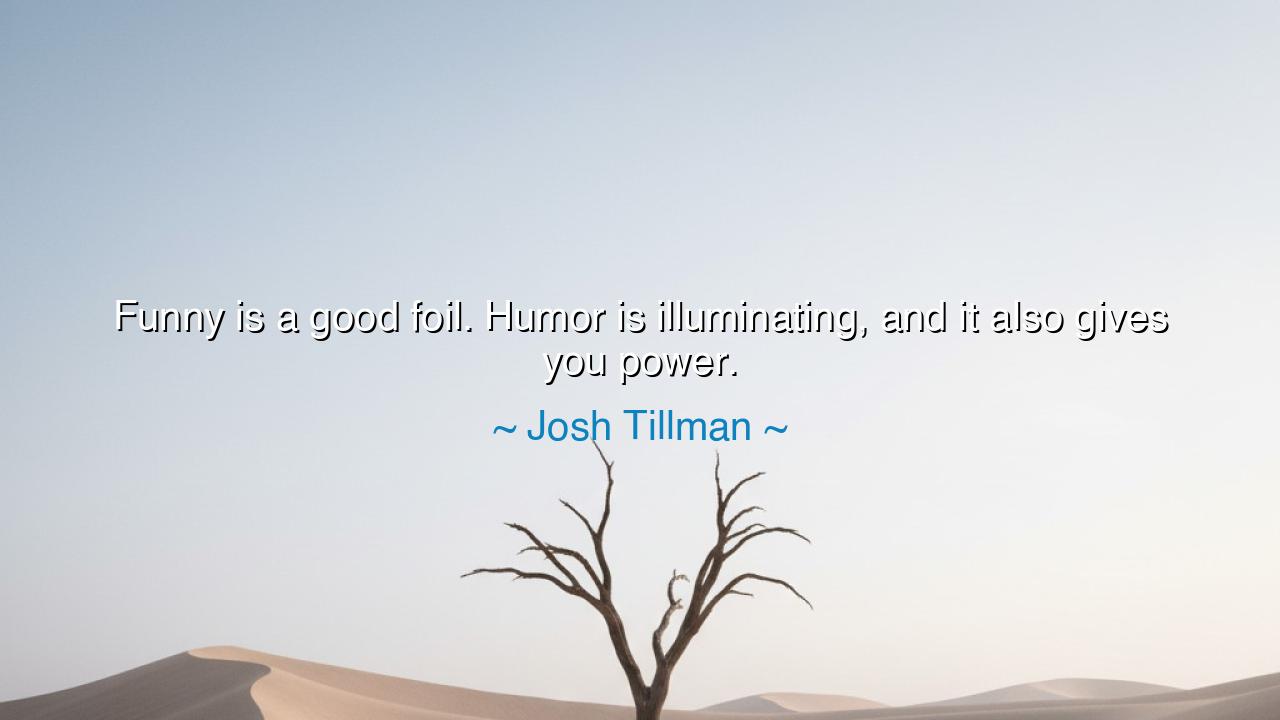
Funny is a good foil. Humor is illuminating, and it also gives






In the words of Josh Tillman, “Funny is a good foil. Humor is illuminating, and it also gives you power.”
Beneath the casual rhythm of these words lies a truth as sharp as it is timeless — that humor is not mere play, but a weapon of light; that wit is both shield and sword, capable of revealing what solemnity hides. Tillman, a poet of contradictions who walks the line between cynicism and sincerity, speaks here of humor not as escape, but as revelation. To call “funny” a foil is to say it stands in contrast — it disarms, deflects, and reflects the deeper truths that lie beneath the surface of human experience. It is a companion to pain, a mirror to power, a flame that exposes hypocrisy even as it warms the heart.
The origin of this wisdom is ancient. The philosophers of Greece, those lovers of reason and irony, understood that laughter could unveil what logic alone could not. Socrates, when accused of impiety, did not rage; he smiled and asked questions so absurdly simple that they stripped his accusers bare. His humor was not mockery but illumination — it revealed the ignorance of the powerful without ever raising a sword. Tillman’s words echo this same inheritance: humor, when used wisely, is not frivolous, but transformative. It shines where anger would burn, and in shining, it empowers.
When Tillman says that humor gives power, he speaks of a force that belongs not to kings or armies, but to the awakened mind. The one who can laugh in the face of fear is unconquerable. The one who can find wit in despair has already transcended it. For humor, at its highest form, is the art of seeing clearly — to witness life in all its absurdity and still choose to smile. This is no weakness; it is mastery. Laughter becomes a rebellion against false authority, a quiet refusal to let pain define the soul. As the poet Oscar Wilde once said, “If you want to tell people the truth, make them laugh, otherwise they’ll kill you.” In this way, humor not only illuminates truth — it smuggles it safely into the hearts of those who would otherwise resist it.
To understand humor as a foil is also to understand that it must stand beside seriousness, not replace it. Just as light reveals the shape of shadow, laughter reveals the depth of sorrow. In this, Tillman’s insight is profound: humor does not erase tragedy — it balances it. Consider Winston Churchill, who in the darkest days of war, joked that if history were kind to him, it would be because he intended to write it. His wit did not deny the terror of his time; it transformed it into courage. His humor was his foil — a way to stand unbroken amid chaos. Through laughter, he reminded his people that the human spirit cannot be conquered by fear.
In every age, the great storytellers and leaders have understood this dual power. Mark Twain, with his twinkling eyes and fearless tongue, spoke hard truths about slavery, hypocrisy, and ignorance — yet he wrapped them in laughter so that even his fiercest critics would listen. His humor illuminated what others hid, and it granted him a kind of moral power no tyrant could seize. For to laugh is to see — and to make others laugh is to help them see as well. Humor, therefore, is not an escape from reality; it is the lens that brings reality into focus.
And yet, Tillman’s words carry a quiet warning too. Humor, like fire, must be wielded with wisdom. In the wrong hands, it burns rather than warms. To use humor for cruelty is to darken its light, to make it a tool of pride rather than of insight. The true power of humor lies not in ridicule, but in revelation — in the ability to unite, to awaken, to humble both speaker and listener. Those who understand this use laughter not to dominate, but to liberate — to remind others that they, too, can rise above fear and folly.
So let this be the lesson of Tillman’s words: seek humor not as distraction, but as illumination. When the world grows heavy, laugh — not to escape its weight, but to understand it more deeply. When you face injustice, use wit as your weapon, but never your poison. Let humor be your foil, your counterbalance, your secret flame. For laughter, when born from wisdom, is the purest act of defiance — and the most powerful act of grace.
And so, dear listener, remember: to find humor in the dark is to find light where none seems to remain. To make another laugh is to give them strength. And to laugh at one’s own pain is to reclaim one’s power. Humor is illumination, and those who wield it wisely walk through the shadows not as victims, but as visionaries — bright, unbroken, and eternally free.






AAdministratorAdministrator
Welcome, honored guests. Please leave a comment, we will respond soon